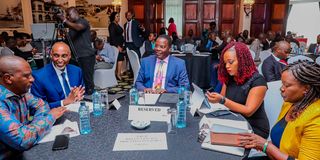EACC to partner with media in fight against graft

From left: Media Council of Kenya CEO David Omwoyo Omwoyo, EACC CEO Abdi Mohamud, EACC Chairperson, Dr David Oginde, Kenya Editors Guild President Zubeidah Kananu and CEO Rosalia Omungo during the Press club luncheon themed "Turning the tide: from stolen assets to public good" at Sarova Stanley Hotel, Nairobi, on April 3, 2025.
The anti-corruption watchdog is set to formalise its collaboration with the media in a strategic move to enhance coverage of graft war and reshape Kenya’s global perception in the fight against the economic crime.
The initiative announced by the Ethics and Anti-Corruption Commission (EACC) on Thursday seeks to improve Kenya’s ranking on the international corruption perception index while restoring public trust in institutions.
During a meeting between the EACC and the Kenya Editors Guild (KEG) in Nairobi, discussions revolved around strengthening transparency, safeguarding recovered assets, and ensuring they serve the public good.
EACC Chairperson, Bishop David Oginde, underscored the importance of going beyond asset tracking and recovery to actively utilising recovered resources for national benefit.
He emphasized that public awareness of EACC’s efforts is crucial and that mainstream media plays a pivotal role in shaping public perception.
“When Kenyans are not aware of our actions, their perception of the fight against corruption is skewed,” he said.
“The Global ranking by Transparency International in its Corruption Perception Index placed Kenya at number 121 out of 180 with a score of 32 percent in 2024. This is a massive improvement from position 126 in 2023, yet we still lag behind the global average of 50 percent.”
He further noted that a poor corruption ranking damages Kenya’s reputation on the global stage, deterring investors and compounding economic challenges.
Beyond discouraging investment, high corruption levels lead to reduced public confidence in institutions, an increased cost of doing business, rising unemployment, and the deterioration of essential public services.
To counter these setbacks, Bishop Oginde announced plans to draft structured mechanisms for media engagement, including formal agreements through Memorandums of Understanding (MoUs).
KEG president Zubeida Koome raised alarm over the scale of financial misconduct in the country and urged a more coordinated approach between public watchdogs and the media.
She pointed out the critical role of journalists in exposing graft but lamented the persistent challenges they face—including legal threats, limited access to crucial data, and even physical dangers.
To boost investigative journalism, Ms Koome proposed that the EACC allocate a portion of recovered assets to support media houses.
This, she argued, would help counter revenue shortfalls and provide training opportunities for journalists specialising in corruption coverage.
“We request you (EACC) to come in and assist the media fraternity through training of journalists on how to cover crime and investigative stories, and through the fund from the recovered assets, help in strengthening investigative and fact-checking desks in newsrooms,” she said.
Nation Media Group’s Editor-in-Chief, Joe Ageyo, echoed similar concerns, citing the rise of misinformation and disinformation campaigns aimed at discrediting journalists.
Fake news
He warned that the misuse of artificial intelligence (AI) to fabricate large-scale fake news is becoming a big threat to media credibility.
“The use of AI to generate perfectly fake information very easily and on a large scale is a direct threat to the credibility of the media. When exposing the corrupt, they tend to fight back and use everything in their power to tarnish the reputation of journalists, and these are some of the things we are struggling with,” Mr Ageyo said.
To combat these challenges, Mr Ageyo urged the EACC to consider allocating a percentage of recovered assets to protect journalists from threats and financial vulnerabilities.
“Independent media is a watchdog in exposing corruption, yet we are currently facing financial struggles, threats of political and commercial influence. Establishing a Media Sustainability Fund financed by recovered stolen assets will go a long way in enhancing media sustainability,” he said.
Africa Editors Forum president Churchill Otieno reinforced this argument, stating that financial instability poses a direct threat to investigative journalism.
Without adequate funding, media houses struggle to maintain the rigorous scrutiny needed to hold the powerful accountable.
“We cannot sustain public accountability without sustaining public good journalism. If we have proper funding, we can have journalism that is well-resourced and tells the truth no matter who is being highlighted for graft,” Mr Otieno said.


